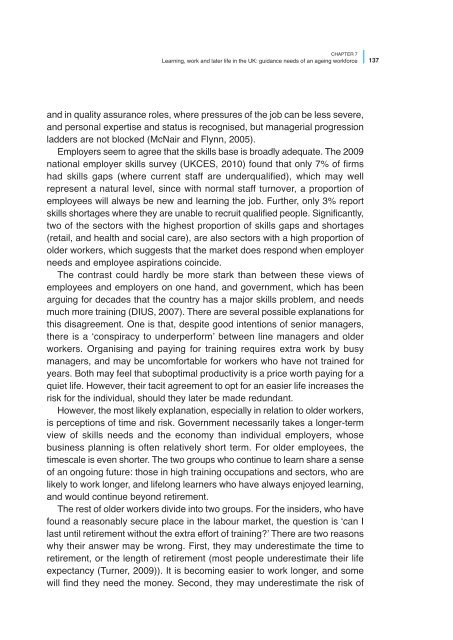Working and ageing - Cedefop - Europa
Working and ageing - Cedefop - Europa
Working and ageing - Cedefop - Europa
Create successful ePaper yourself
Turn your PDF publications into a flip-book with our unique Google optimized e-Paper software.
CHAPTER 7<br />
Learning, work <strong>and</strong> later life in the UK: guidance needs of an <strong>ageing</strong> workforce 137<br />
<strong>and</strong> in quality assurance roles, where pressures of the job can be less severe,<br />
<strong>and</strong> personal expertise <strong>and</strong> status is recognised, but managerial progression<br />
ladders are not blocked (McNair <strong>and</strong> Flynn, 2005).<br />
Employers seem to agree that the skills base is broadly adequate. The 2009<br />
national employer skills survey (UKCES, 2010) found that only 7% of firms<br />
had skills gaps (where current staff are underqualified), which may well<br />
represent a natural level, since with normal staff turnover, a proportion of<br />
employees will always be new <strong>and</strong> learning the job. Further, only 3% report<br />
skills shortages where they are unable to recruit qualified people. Significantly,<br />
two of the sectors with the highest proportion of skills gaps <strong>and</strong> shortages<br />
(retail, <strong>and</strong> health <strong>and</strong> social care), are also sectors with a high proportion of<br />
older workers, which suggests that the market does respond when employer<br />
needs <strong>and</strong> employee aspirations coincide.<br />
The contrast could hardly be more stark than between these views of<br />
employees <strong>and</strong> employers on one h<strong>and</strong>, <strong>and</strong> government, which has been<br />
arguing for decades that the country has a major skills problem, <strong>and</strong> needs<br />
much more training (DIUS, 2007). There are several possible explanations for<br />
this disagreement. One is that, despite good intentions of senior managers,<br />
there is a ʻconspiracy to underperformʼ between line managers <strong>and</strong> older<br />
workers. Organising <strong>and</strong> paying for training requires extra work by busy<br />
managers, <strong>and</strong> may be uncomfortable for workers who have not trained for<br />
years. Both may feel that suboptimal productivity is a price worth paying for a<br />
quiet life. However, their tacit agreement to opt for an easier life increases the<br />
risk for the individual, should they later be made redundant.<br />
However, the most likely explanation, especially in relation to older workers,<br />
is perceptions of time <strong>and</strong> risk. Government necessarily takes a longer-term<br />
view of skills needs <strong>and</strong> the economy than individual employers, whose<br />
business planning is often relatively short term. For older employees, the<br />
timescale is even shorter. The two groups who continue to learn share a sense<br />
of an ongoing future: those in high training occupations <strong>and</strong> sectors, who are<br />
likely to work longer, <strong>and</strong> lifelong learners who have always enjoyed learning,<br />
<strong>and</strong> would continue beyond retirement.<br />
The rest of older workers divide into two groups. For the insiders, who have<br />
found a reasonably secure place in the labour market, the question is ʻcan I<br />
last until retirement without the extra effort of training?ʼ There are two reasons<br />
why their answer may be wrong. First, they may underestimate the time to<br />
retirement, or the length of retirement (most people underestimate their life<br />
expectancy (Turner, 2009)). It is becoming easier to work longer, <strong>and</strong> some<br />
will find they need the money. Second, they may underestimate the risk of

















